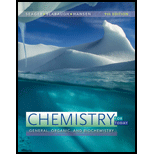
Concept explainers
(a)
Interpretation:
The concentration in
Concept introduction:
A solution is prepared by mixing proper amount of solute and solvent. The concentration of solution when measured on the basis of solution volume, is expressed in terms of percent weight by volume
Answer to Problem 7.31E
The concentration in
Explanation of Solution
The formula to calculate concentration in
The density of water is
The concentration in
(b)
Interpretation:
The concentration in
Concept introduction:
A solution is prepared by mixing proper amount of solute and solvent. The concentration of solution when measured on the basis of solution volume, is expressed in terms of percent weight by volume
Answer to Problem 7.31E
The concentration in
Explanation of Solution
The formula to calculate number of moles of solutes is given below as,
Rearrange the above equation for mass of solute as follows.
The molar mass of
Substitute the values in the above equation as follows.
The formula to calculate concentration in
The density of water is
The concentration in
(c)
Interpretation:
The concentration in
Concept introduction:
A solution is prepared by mixing proper amount of solute and solvent. The concentration of solution when measured on the basis of solution volume, is expressed in terms of percent weight by volume
Answer to Problem 7.31E
The concentration in
Explanation of Solution
The formula to calculate concentration in
The density of water is
The concentration in
(d)
Interpretation:
The concentration in
Concept introduction:
A solution is prepared by mixing proper amount of solute and solvent. The concentration of solution when measured on the basis of solution volume, it is expressed in terms of percent weight by volume
Answer to Problem 7.31E
The concentration in
Explanation of Solution
The formula to calculate concentration in
The formula to calculate density is given below as,
Where,
•
•
•
The density of ethyl alcohol is
The density of ethylene glycol is
Substitute the value of mass of ethyl alcohol and mass of solution in the equation (1) as follows.
The concentration in
Want to see more full solutions like this?
Chapter 7 Solutions
LMS Integrated OWLv2, 4 terms (24 months) Printed Access Card for Seager/Slabaugh/Hansen’s Chemistry for Today: General, Organic, and Biochemistry, 9th
 Introductory Chemistry: A FoundationChemistryISBN:9781337399425Author:Steven S. Zumdahl, Donald J. DeCostePublisher:Cengage Learning
Introductory Chemistry: A FoundationChemistryISBN:9781337399425Author:Steven S. Zumdahl, Donald J. DeCostePublisher:Cengage Learning
 ChemistryChemistryISBN:9781305957404Author:Steven S. Zumdahl, Susan A. Zumdahl, Donald J. DeCostePublisher:Cengage Learning
ChemistryChemistryISBN:9781305957404Author:Steven S. Zumdahl, Susan A. Zumdahl, Donald J. DeCostePublisher:Cengage Learning Chemistry: An Atoms First ApproachChemistryISBN:9781305079243Author:Steven S. Zumdahl, Susan A. ZumdahlPublisher:Cengage Learning
Chemistry: An Atoms First ApproachChemistryISBN:9781305079243Author:Steven S. Zumdahl, Susan A. ZumdahlPublisher:Cengage Learning General Chemistry - Standalone book (MindTap Cour...ChemistryISBN:9781305580343Author:Steven D. Gammon, Ebbing, Darrell Ebbing, Steven D., Darrell; Gammon, Darrell Ebbing; Steven D. Gammon, Darrell D.; Gammon, Ebbing; Steven D. Gammon; DarrellPublisher:Cengage Learning
General Chemistry - Standalone book (MindTap Cour...ChemistryISBN:9781305580343Author:Steven D. Gammon, Ebbing, Darrell Ebbing, Steven D., Darrell; Gammon, Darrell Ebbing; Steven D. Gammon, Darrell D.; Gammon, Ebbing; Steven D. Gammon; DarrellPublisher:Cengage Learning





